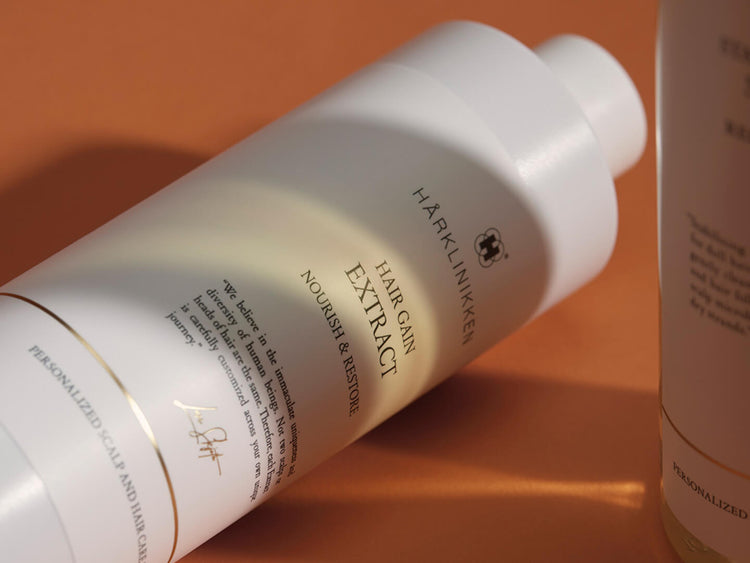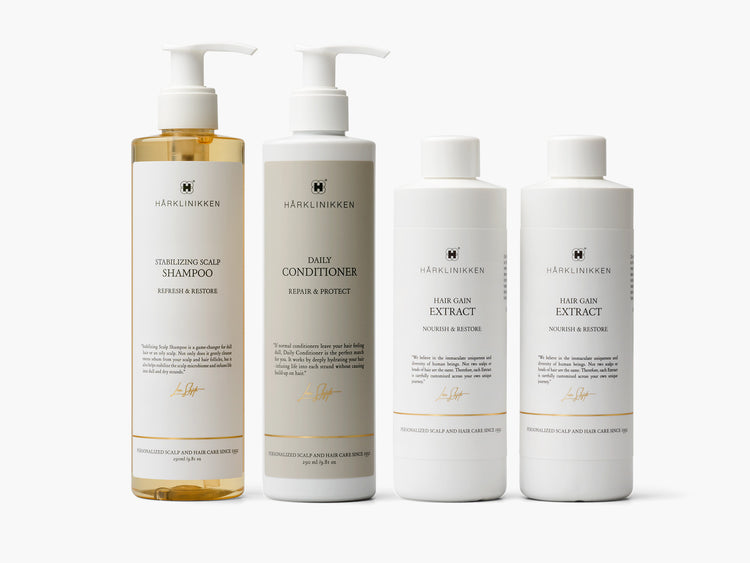There’s a lot of controversy surrounding the topic of shampooing frequency. Many swear by the once-a-week shampoo, claiming that it retains your hair’s natural shine and regulates your scalp microbiome. In the beauty world, it’s often seen as taboo to wash your hair daily.
This can be true if you’re using harsh shampoos and products that strip your scalp or weaken your hair strands. However, it truly depends on your choice of products, cleansing method, and your unique hair and scalp type.
Try to shampoo daily or every other day
While shampoos with problematic ingredients can do damage, using the right products made with the right technology and combination of ingredients will benefit the scalp and hair.
Our leading hair and scalp scientist Lars Skjøth views the scalp like the skin on your face: “Think of it this way: do you wash your face daily? Just like the skin on your face, your scalp needs to be cleansed, nourished and cared for properly for it to function at its best. The skin on your scalp is more delicate than that on your face and also needs frequent attention.”
Doesn’t shampooing daily make your hair more greasy?
The truth is: you can't prevent your hair from becoming greasy. There’s this common misconception that reducing the number of times you shampoo per week can slow down the rate of your hair and scalp’s oil production.
If you're born with an oily scalp, it will not make a difference if you skip a few washes; your scalp is still going to be oily. This is more reason to wash your hair daily or as frequently as you can.
It depends on your hair type
While we recommend frequent scalp cleansing, everybody is different and may have different needs. The frequency you wash your hair mostly depends on your hair type.
Straight hair: wash daily
Straight hair types can be prone to higher oil production. The straight strands make it easier for oil on the scalp to slide down the hair, especially if it’s thin hair. This is why it’s generally recommended for those with straight hair types to wash their hair daily.
Make sure that if you do shampoo daily, you use gentle cleansers to prevent scalp dryness and itchiness. If you can’t wash your hair every day, aim for every other day with a deep-cleansing shampoo that is sulfate and paraben-free. It’s also important to implement a thorough hydration routine following your shampoo.
Wavy hair: wash daily or every other day
People with wavy hair types should also wash their hair daily or every other day. Wavy hair tends to accumulate oil and product buildup more quickly than curlier textures, especially at the roots, while the ends may remain drier. Regular washing helps maintain scalp health and prevents the waves from becoming weighed down or greasy.
Lightweight, sulfate-free shampoos are ideal to avoid stripping natural oils, and it could be beneficial to alternate between a clarifying shampoo and a moisturizing one. For those who style their waves frequently or use heavier products, cleansing more often may be necessary to keep the scalp balanced and hair feeling fresh.
Curly hair: a bit more nuanced
Curly hair often requires a more tailored cleansing routine due to its unique structure. The spiral shape of curls makes it difficult for natural oils (sebum) to travel down the hair shaft, which can lead to dryness, particularly at the ends. As a result, curly hair needs maximum hydration to remain healthy, defined, and manageable.
While some people with looser curls may benefit from washing daily or every other day, those with tighter curl patterns may prefer less frequent cleansing to retain moisture. Variance in curl type plays a significant role in determining the ideal routine.
It’s important to use gentle, hydrating products. In addition to a mild cleansing shampoo, A moisturizing shampoo can help support the structure of curly hair, while strengthening and conditioning without stripping essential oils.
Coily hair: wash twice a week
People with coily hair should make sure their scalp is thoroughly cleansed, as the high density of the hair can make it harder to reach the scalp. Some may need to shampoo every other day, while others may only need to wash once a week or every 10 days.
In most cases, washing twice a week is best. A gentle way to clean the scalp without having to wet the hair is to use a washcloth with a diluted mixture of shampoo and water. Coily hair can also be rinsed with water and conditioner between washes.
Does shampooing everyday help with hair growth?
While washing your hair daily might not directly impact the rate at which your hair grows, it does support healthy hair growth. When you have excess sebum and buildup left on your scalp, it can create blockages in your hair follicles or lead to irritation, throwing off the scalp’s ecosystem.
Not cleaning or caring for your scalp can lead to scalp irritation, redness, scalp inflammation, and folliculitis (inflammation in hair follicles) which can ultimately result in hair thinning.
The better you treat your hair follicles, the longer and healthier hairs they will produce.
Maintaining ideal pH balance
When your shampoo is formulated in the right way, it helps balance your scalp microbiome, resulting in the ideal pH level. An ideal pH level is crucial when creating optimal conditions for healthy hair growth and decreasing hair thinning, shedding and loss.
What is the best method for shampooing?
We have an entire article dedicated to best methods for shampooing depending on your hair and scalp type. But the short version is this: wet hair with lukewarm to warm water, emulsify shampoo in your hands before applying underneath your hair onto your scalp, massage into your scalp using your fingers for about 30 seconds, and rinse thoroughly.
How often should I wash my hair if I exercise every day?
Exercise can have an impact on scalp health and hair loss. This is due to buildup caused by sweat (along with sebum, dead skin cells, dirt, products and pollutants).
You should wash your scalp and hair frequently if you sweat during exercise, as leaving oil and sweat on your scalp for too long can result in conditions that may lead to hair loss.
How can I tell if I’m over-washing my hair and scalp?
Daily use of other shampoos might leave your hair dull, brittle, or frizzy and your scalp feeling tight, dry or even irritated and itchy.
So if you are washing every day, make sure you’re replenishing your hair’s moisture each time with deep conditioners, hair masks, and leave-in conditioners to help keep your hair from drying out. You’ll also want to avoid blow-drying or heat-styling after your daily showers, or at least implement a hydrating and protective leave-in before drying your hair to prevent damaging your lengths.

Unsure where to start?
We only accept candidates who we believe we can help, which is why our online Hair Assessment is the best place to start. Based on your results, you will either qualify for immediate treatment or we will organize a consultation.




